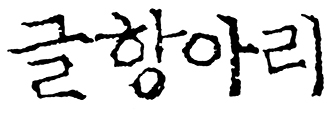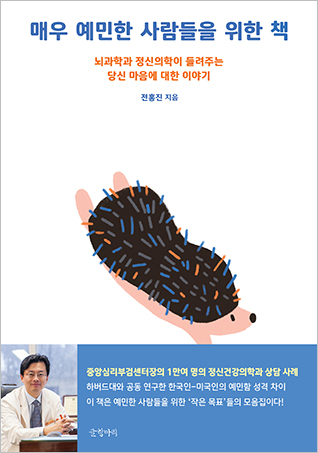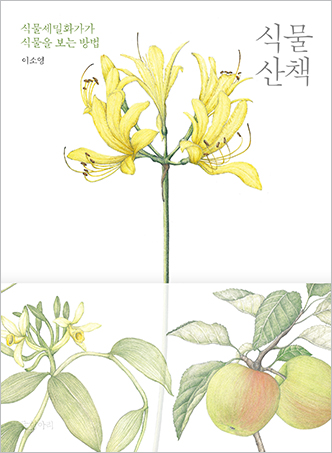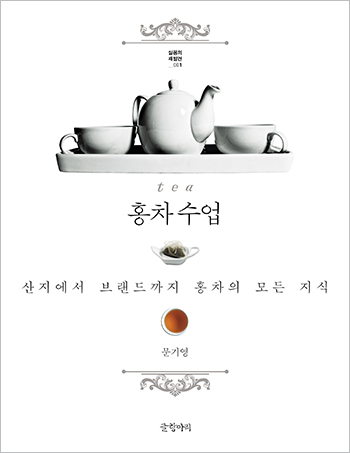|
Geulhangari A Repository of Knowledge
2020.12.07
Logo of Geulhangari
Since its establishment in 2007, Geulhangari has published around 800 titles, with a majority of them being so-called "brick books" due to how thick they are (close to a whopping 1,000 pages!). Under the company motto of "boring books are the grave of ideas," Geulhangari has been focusing on publishing history, philosophy, and classical books while expanding their fields into literature, essay, science, and not to mention practical books. While working at its best to become a publisher of various colors, let's look into what Geulhangari has to say.
Please introduce Geulhangari to overseas publishers.
Geulhangari has been publishing books in various fields, including humanity, history, philosophy, art, and science, since the first title was released in 2007. While the big base is humanity and social science, we are trying to digest various fields when we discover fine titles. And we are mostly known as a publisher that makes "brick books" that are as long as 1,000 pages.
What path has Geulhangari been walking on since 2007, and what are your achievements so far?
We have published about 800 titles since we first opened our doors. It has been ten years of endeavor, discovering and publishing meaningful writings reflecting the meaning of the name Geulhangari, which derived from a story of Yeonam Park Ji-Won, who is known to have kept even the most trivial memos in life inside a pot. In the early years, we focused on history, philosophy, and classical titles, but now we are adding literature, essay, science, and practical books. And we think that being known and remembered as a publisher that "steadily" releases "many" of the profound liberal arts books is one of the achievements we have made until today.
Geulhangari has been steadily publishing a variety of liberal arts books ever since the first title was released in 2007.
Could you please introduce three of the representative books of Geulhangari to our overseas readers?
A Book for Highly Sensitive Person written by Jeon Hong-Jin, 2020
A Book for Highly Sensitive Person, Wandering with Plants, Black Tea
Does Geulhangari have a standard or values that it considers when it comes to choosing authors or titles?
We tend to take a general look at the text, author's career, or the topic rather than sticking to a particular standard or values. Because we always have the idea that we should publish books that talk about topics our society needs, we prefer authors that cover such issues that raise awareness about new topics or those that others have not touched upon yet. Instead of signing a contract with a famous writer, we try to be a container for a variety of personalities.
Geulhangari always keeps the idea in mind that we should publish books
What is the major area of Geulhangari, and what is your growth momentum?
As we've mentioned above, we are now expanding our field into literature, essay, science, and practical knowledge from where we have been focusing on history, philosophy, and classical areas before. But still, we have not set foot in economics, business administration, self-development, and children's books. So the company is not a general publisher, so to say. Just think of us as a publisher that produces books in the great world of liberal arts and science. We believe that it was just natural to expand our publication areas. We separated Geulhangari Science as an independent brand as the importance of science grew, set up a Chinese modern novel category as we promoted learning more about China, and planned various essay books to glimpse how life would change after COVID-19. We also try to seek new opportunities, as pushing only one field would eventually have a limit in market size, and you may no longer be fast-responding to changing trends. And for the growth momentum, we think that concentrating on publishing is the power that keeps us going forward.
Geulhangari has this unique section called "EDITOR'S NOTE." It is refreshing to see the unique ideas of the editors. Is there a reason for having this separate editor's note?
Editors play a critical role in making books, but their efforts are not recognized much after publication. In fact, editors are the ones that know everything about the book as they have been there from the beginning of the production, but they do not commonly have a chance to communicate with readers. To help readers listen to the editors' story and help editors communicate with the readers, we have created the "EDITOR'S NOTE." All for our readers that are curious about what happened after the end of the story.
What kind of publisher does Geulhangari want to become, and what are your future plans?
"Boring books are the grave of ideas" was the motto when Geulhangari was first established. We believe that books must be fun and entertaining, which means that messages have to melt naturally inside the story. It could be possible for the publisher to push forward with a specific stance or values, but it would leave out various ideas. We are still pursuing the motto we set in the beginning as we publish, and it is our goal to not lose steam.
Website geulhangari.com
Organized by Lee Ji-Hyeon
|
Pre Megazine
-

Jakkajungsin Publishing Co.
VOL.69
2024.04 -

Writer Yun Jung-Eun
VOL.69
2024.04 -

Jumping Books Publishing House
VOL.68
2024.03 -

Writer Kim Hwa-Jin
VOL.68
2024.03 -

Publisher Hyohyung
VOL.67
2024.02 -

Writer Minha
VOL.67
2024.02 -

Almond Publishing
VOL.66
2024.01 -

Writer Kwon Jung-Min
VOL.66
2024.01 -

Hakgojae Publishers
VOL.65
2023.12 -

Writer Kim Hye-Jung
VOL.65
2023.12 -

Eidos Publishing House
VOL.64
2023.11 -

Writer Hwang In-Chan
VOL.64
2023.11 -

Munhakdongne
VOL.63
2023.10 -

Writer Chang Kang-myoung
VOL.63
2023.10 -

Happywell Publishing
VOL.62
2023.09 -

Writer Baik Soulinne
VOL.62
2023.09 -

Dasan Contents Group (Dasan Books)
VOL.61
2023.08 -

Writer Lim Kyoung-Sun
VOL.61
2023.08 -

SpringSunshine Publishing Co.
VOL.60
2023.07 -

Writer Lee Kyung-Hye
VOL.60
2023.07 -

Human Cube
VOL.59
2023.06 -

Doctor Jeong Jae-Seung
VOL.59
2023.06 -

Anonbooks
VOL.58
2023.05 -

Writer Son Bo-Mi
VOL.58
2023.05 -

Namhaebomnal
VOL.57
2023.04 -

Writer Kim Bo-Young
VOL.57
2023.04 -

Hugo Publishing
VOL.56
2023.03 -

Writer Cho Kwang-Hee
VOL.56
2023.03 -

Balgeunmirae Publishing Co.
VOL.55
2023.02 -

Writer Lee Byung-Ryul
VOL.55
2023.02 -

Wisdom House, Inc
VOL.54
2023.01 -

Writer Jeong Jia
VOL.54
2023.01 -

Humanitas
VOL.53
2022.12 -

Writer Kim Yeon-Su
VOL.53
2022.12 -

Songsongbooks
VOL.52
2022.11 -

Writer Eun Hee-Kyung
VOL.52
2022.11 -

Bombom Publishing Co.
VOL.51
2022.10 -

Writer Jiwon Yu
VOL.51
2022.10 -

Hangilsa Publishing Co., Ltd.
VOL.50
2022.09 -

Writer Kim Won-Young
VOL.50
2022.09 -

Moksu Publishing Company
VOL.49
2022.08 -

Writer Yoo Sun-Kyong
VOL.49
2022.08 -

Next Wave
VOL.48
2022.07 -

Writer Park Sang-Young
VOL.48
2022.07 -

A Thousand Hopes
VOL.47
2022.06 -

Writer Bora Chung
VOL.47
2022.06 -

Woongjin ThinkBig
VOL.46
2022.05 -

Dr. Oh Eun-Young
VOL.46
2022.05 -

JECHEOLSO Publishing House
VOL.45
2022.04 -

Writer Jang Ryu-Jin
VOL.45
2022.04 -

Changbi Publishers
VOL.44
2022.03 -

Writer Kim Ho-Yeon
VOL.44
2022.03 -

Mati Books
VOL.43
2022.02 -

Writer Lee Kkoch-Nim
VOL.43
2022.02 -

Picturebook Gongjackso
VOL.42
2022.01 -

Writer Kim Sang-Wook
VOL.42
2022.01 -

Writer So-yeon Park
VOL.42
2022.01 -

Writer Yoo Eun sil
VOL.42
2022.01 -

Kungree Press
VOL.41
2021.12 -

Writer Kim Lily
VOL.41
2021.12 -

Writer Park Yeon-jun
VOL.41
2021.12 -

Writer Yi Hyeon
VOL.41
2021.12 -

A deeper world told through picture books 'Iyagikot Publishing (Story Flower)'
VOL.12
2019.06 -

Author Jeon Min-hee
VOL.12
2019.06 -

Illustrator Kim Hwan-Young
VOL.13
2019.07 -

Travelers sailing through the sea of knowledge - 'Across Publishing Group Inc.'
VOL.13
2019.07 -

Genre Novel Publisher 'Arzak Livres'
VOL.14
2019.08 -

Author Lee Yong-han
VOL.14
2019.08 -

Wookwan Sunim
VOL.15
2019.09 -

East-Asia Publishing
VOL.15
2019.09 -

Author Jo Jung-rae
VOL.16
2019.10 -

EunHaeng NaMu Publishing
VOL.16
2019.10 -

Writer Heo Kyo bum
VOL.40
2021.11 -

Writer Kim So-Young
VOL.40
2021.11 -

Author-illustrator Kim Sang Keun
VOL.40
2021.11 -

ACHIMDAL BOOKS
VOL.40
2021.11 -

Author Kang Gyeong-su
VOL.17
2019.11 -

Moonji Publishing Belongs to the Literary Community
VOL.17
2019.11 -

Author Kim Yun-jeong
VOL.18
2019.12 -

I-Seum
VOL.18
2019.12 -

Kim Cho-Yeop
VOL.19
2020.02 -

Creating a window into the future with books
VOL.19
2020.02 -

Author Serang Chung
VOL.20
2020.03 -

Hey Uhm
VOL.20
2020.03 -

Writer Lim Hong-Tek
VOL.21
2020.04 -

BIR
VOL.21
2020.04 -

Writer Song Mikyoung
VOL.39
2021.10 -

Author-illustrator Kim Dong Su
VOL.39
2021.10 -

Writer Lee Seula
VOL.39
2021.10 -

Tabi Books
VOL.39
2021.10 -

Writer Kim Soo-hyun
VOL.38
2021.09 -

Author-illustrator Lee Myoung Ae
VOL.38
2021.09 -

Writer Hwang Sunmi
VOL.38
2021.09 -

Kidari Publishing Co.
VOL.38
2021.09 -

Writer Sohn Won-Pyung
VOL.22
2020.05 -

Woods of Mind's Books
VOL.22
2020.05 -

Writer Heungeul
VOL.23
2020.06 -

Gloyeon
VOL.23
2020.06 -

Maumsanchaek
VOL.24
2020.07 -

Winners of the 2021 Bologna Ragazzi Award
VOL.37
2021.08 -

Picture book artist Lee Suzy
VOL.37
2021.08 -

Author-illustrator Yi Gee Eun
VOL.37
2021.08 -

Hubble
VOL.37
2021.08 -

Writer Baek Se-Hee
VOL.25
2020.08 -

Bearbooks Inc.
VOL.25
2020.08 -

Author Baek Hee-Na
VOL.26
2020.09 -

Yuksabipyoungsa
VOL.26
2020.09 -

Writer Kang Hwa-Gil
VOL.27
2020.10 -

Kinderland (Bandal)
VOL.27
2020.10 -

Writer Ha wann
VOL.36
2021.07 -

Author-illustrator Myung Soojung
VOL.36
2021.07 -

Writer Jung Yeo-Wool
VOL.36
2021.07 -

Publisher EcoLivres
VOL.36
2021.07 -

Writer Lee Geumi
VOL.28
2020.11 -

Sakyejul
VOL.28
2020.11 -

Writer Kim Keum-Hee
VOL.29
2020.12 -

Geulhangari
VOL.29
2020.12 -

Writer Cheon Seon-Ran
VOL.30
2021.01 -

Hyang Publishing House
VOL.30
2021.01 -

Writer Lee Hee-Young
VOL.31
2021.02 -

Sanzini
VOL.31
2021.02 -

Publisher Prunsoop
VOL.32
2021.03 -

Writer Sim Yun-Kyung
VOL.32
2021.03 -

Hanbit Media
VOL.35
2021.06 -

Hyeonamsa
VOL.33
2021.04 -

Author-illustrator Noh Inkyung
VOL.33
2021.04 -

Writer Cho Won-Jae
VOL.35
2021.06 -

Writer Kim Jung-Mi
VOL.34
2021.05 -

Safehouse Inc.
VOL.34
2021.05













